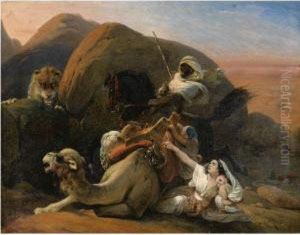Heinrich Schopin Paintings
Heinrich Schopin, born Friedrich Heinrich Christian Schopin on February 2, 1804, in Hanover, Germany, was a 19th-century historical painter. Although not as widely recognized as some of his contemporaries, Schopin carved out a niche for himself in the realm of history painting, a genre that sought to depict scenes from history, literature, and mythology with an emphasis on grandeur and moral lessons.
Schopin was active during a period of art that was marked by Romanticism, which often emphasized emotion and individualism, as well as an appreciation for nature, history, and the past. He received his early art education at the Academy of Fine Arts Munich, which was one of the most important art schools in the 19th-century German-speaking world. His talent was evident early on, and he continued to hone his skills with dedication, focusing particularly on historical themes.
In 1829, he moved to Düsseldorf, which was another important center for art in Germany at the time. The Düsseldorf Academy was known for its influence on German Romantic painting, and it was here that Schopin likely further developed his style. His works from this period show a keen interest in the drama of history and a meticulous attention to detail, which was characteristic of the Düsseldorf school.
Throughout his career, Schopin produced numerous works that were well-received by his contemporaries. His paintings often depicted scenes from German history, such as the lives of the Teutonic Knights, as well as other European historical events. He also drew inspiration from literature, creating visual interpretations of works by famous writers such as William Shakespeare and Johann Wolfgang von Goethe.
Despite his skill and the relevance of his work during his lifetime, Schopin has not maintained a prominent place in art history. His style and approach to historical painting became less popular as the 19th century waned, overtaken by new movements such as Impressionism, which focused more on modern life and the play of light than on historical narratives.
Heinrich Schopin passed away on December 17, 1880, in Düsseldorf. His contributions to historical painting are still recognized by some scholars and enthusiasts of 19th-century art, and his works can be found in various European art collections, serving as a testament to the rich tapestry of historical painting during this period.
